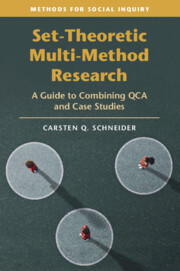6 - Necessary Conditions
Published online by Cambridge University Press: 22 February 2024
Summary
Most applied QCA, and thus applied SMMR, focus on claims of sufficiency. Some, though, also includes claims of necessity. In this chapter, it is explained how the SMMR principles and practices developed for claims of sufficiency also work for claims of necessity. It starts with the simplest possible, and also most often encountered, form of necessity claims: that of a single condition being necessary for the outcome. After this, disjunctive and then conjunctive necessity claims are discussed. Learning goals: - Understand that only minor adjustments are needed to SMMR types of cases, forms of single-case and comparative designs, principles, formulas, and ranks when the cross-case solution postulates a necessary condition - Consolidate the knowledge of SMMR principles, types of cases, formulas, and ranks - Further practice the use of the smmr() function and the interpretation of its output
- Type
- Chapter
- Information
- Set-Theoretic Multi-Method ResearchA Guide to Combining QCA and Case Studies, pp. 165 - 221Publisher: Cambridge University PressPrint publication year: 2024



